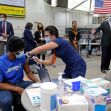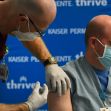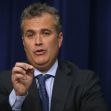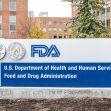COVID-19 vaccinations will soon be headed to local pharmacies in communities across the nation as the White House kicks off the Federal Retail Pharmacy Program. The new program, which pledges access and equity, is set to begin on February 11 with 6,500 participating pharmacies.
At a February 2 briefing, Jeff Zients, the White House COVID-19 coordinator, gave a realistic but optimistic outline of the new partnership that he hopes will eventually include 40,000 providers. Sites will include local independent pharmacies, national pharmacy chains, and supermarkets.
Zients made it clear that Phase One of the program will begin small and then scale up. “I want to set expectations appropriately,” he said. “Due to the current supply constraints, this will be limited when it begins next week.” He then pledged that the new program will expand access across the country so appointments can be made to receive vaccinations conveniently and quickly.
A critical component of the new effort will be equity, which he said is “at the core of how the CDC (Centers for Disease Control and Prevention) is working with states to select pharmacy partners.” He also stressed that sites will be selected for their ability to reach the most at-risk populations, including those living in “socially vulnerable communities.” He explained that the CDC will continually monitor data to assure efficiency and equity.
Zients said that partnering with pharmacies will “get more shots in arms and will make sure pharmacies have the infrastructure and expertise they need to scale up in the months ahead.”
While explaining that vaccine supplies were up 16 percent last week and will increase by another five percent this week, he also cautioned that production of the vaccine is only part of the problem. “We also need easily accessible places for Americans to get vaccinated,” he said, noting that “millions of Americans turn to local pharmacies every day for medicine, flu shots and much more. And, pharmacies are readily accessible to most communities with most Americans living within five miles of a pharmacy.”
He then advised those interested in getting vaccinated to first make sure they meet the eligibility requirements set by their state and next check the website of their local pharmacy to learn whether vaccinations will be available there.
A check of two popular pharmacies in the Los Angeles area provided little helpful information at this time. CVS requires those interested in vaccination to fill out a rather extensive questionnaire that asked for information about zip codes, birthdays, symptoms, possible exposures, current medical conditions or pregnancy, whether they work in health care or special settings with a high risk of COVID-19 transmission, and quite a few more relevant matters. The visitor then must acknowledge they have answered questions truthfully and are told that they must perform their own nasal swab or bring someone with them to do it for them.
Despite the entered birthday putting the visitor’s age at 72, well within California eligibility requirements, after completing the survey, the screen stated, “You do not qualify for testing at this time.” But, it said, “We may still be able to help,” and told viewers to call 911 if experiencing a medical emergency, call a healthcare provider, arrange for a telemedical service by clicking on an E-Clinic or Video visit link, or get any antibody test, by clicking. Finally, it provided a link for a $139 test that assured the visitor that credit and debit cards would be accepted. Two different zip codes from two different communities with varying demographics were entered. It made no difference.
Walgreens was next. The website home page stated, “Limited vaccines are now available in select areas,” then provided links to sites such as the CDC and a place with 20 “Frequently Asked Questions.” The first FAQ was: “Are COVID-19 vaccines available?” The answer told the visitor that two vaccines had been approved by the FDA, that eligibility decisions are made by state and local governments, and that “Over the next several months, more people will become eligible for the vaccine through a phased priority approach.”
To proceed, Walgreens requires the visitor to sign in to an existing account, or create one, then to complete a short screening, and choose a location and time for an appointment. At the conclusion of this process, the visitor is told that Walgreens would “verify” the information and send an email “once they have finished their review.”
It does not appear useful to visit a pharmacy website at this time.
During his briefing, Zients said that the new pharmacy program is just one part of a national vaccination effort which also includes mass vaccination sites, mobile clinics, community health centers, and other providers. Walgreens told Politico it would begin using its federal doses on February 11. Hopefully, pharmacy websites will be more user-friendly soon.
The White House briefing, covered in full by C-SPAN, included an announcement that the Federal Emergency Management Agency (FEMA) would be reimbursing states for expenses related to National Guard activations and other activities related to the pandemic. He said that FEMA’s funding did not require congressional approval. He estimated the cost at between $3 and $5 trillion.






